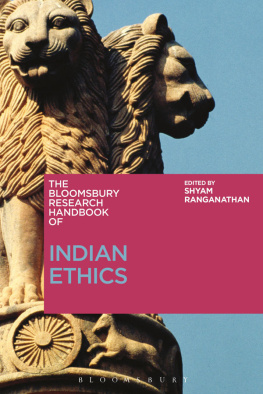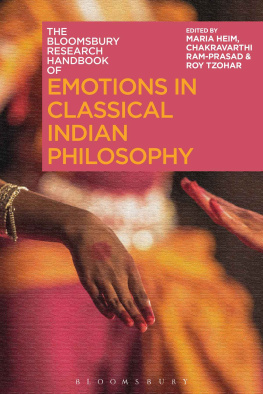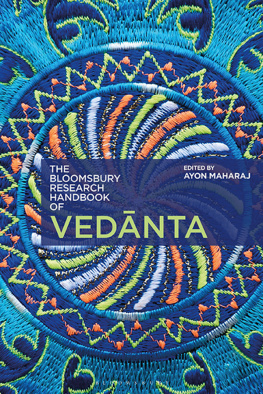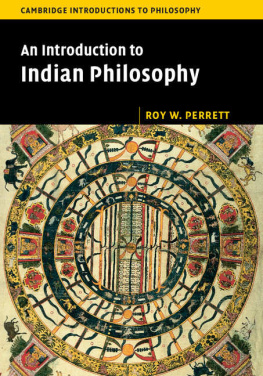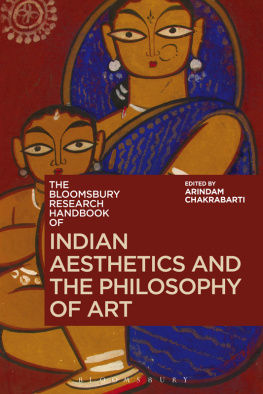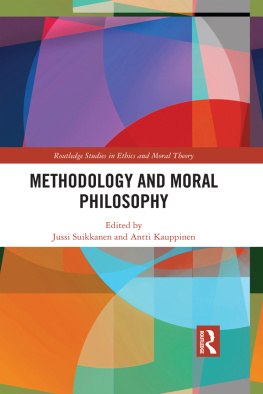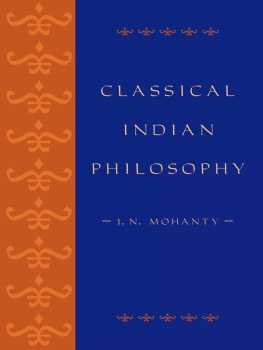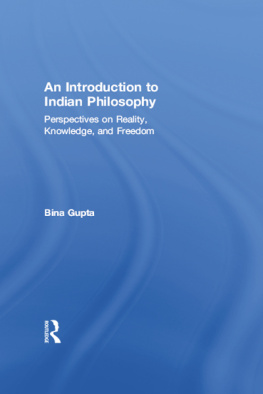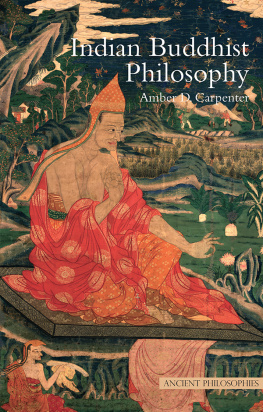THE BLOOMSBURY RESEARCH HANDBOOK OF
INDIAN ETHICS
BLOOMSBURY RESEARCH HANDBOOKS
IN ASIAN PHILOSOPHY
Series Editors:
Chakravarthi Ram-Prasad, Lancaster University, UK.
Sor-hoon Tan, National University of Singapore.
Editorial Advisory Board:
Roger Ames, University of Hawaii; Doug Berger, Southern Illinois University; Carine Defoort, KU-Leuven; Owen Flanagan, Duke University; Jessica Frazier, University of Kent; Chenyang Li, Nanyang Technological University; Ronnie Littlejohn, Belmont University; Evan Thompson, University of British Columbia.
Series description:
Bringing together established academics and rising stars, Bloomsbury Research Handbooks in Asian Philosophy survey philosophical topics across all the main schools of Asian thought. Each volume focuses on the history and development of a core subject in a single tradition, asking how the field has changed, highlighting current disputes, anticipating new directions of study, illustrating the Western philosophical significance of a subject, and demonstrating why a topic is important for understanding Asian thought.
From knowledge, being, gender, and ethics, to methodology, language, and art, these research handbooks provide up-to-date and authoritative overviews of Asian philosophy in the twenty-first century.
Other titles in the series:
The Bloomsbury Research Handbook of Chinese Philosophy and Gender, edited by Ann A. Pang-White
The Bloomsbury Research Handbook of Chinese Philosophy Methodologies,
edited by Sor-hoon Tan
The Bloomsbury Research Handbook of Indian Aesthetics and the Philosophy of Art,
edited by Arindam Chakrabarti
THE BLOOMSBURY RESEARCH HANDBOOK OF
INDIAN ETHICS
Edited by Shyam Ranganathan
Bloomsbury Academic
An imprint of Bloomsbury Publishing Plc

CONTENTS
Shyam Ranganathan
Shyam Ranganathan
Shyam Ranganathan
Shyam Ranganathan
Shyam Ranganathan
Jake H. Davis
Jayandra Soni
Shyam Ranganathan
Kisor K. Chakrabarti
William Edelglass
Shyam Ranganathan
Dagmar Wujastyk
Francis X. Clooney, S. J.
Edeltraud Harzer
A. Raghuramaraju
Ashwani Peetush
The purpose of this book is to bring together the best of contemporary research into Indian ethicscutting edge was how it was described to me. I hope it approximates this ideal.
This topic was initially a curiosity for meone that had to do with philosophical interests in metaethics, the philosophy of thought and translation. My South Asian background made more sense to me in my moral philosophy classes as a North American, nineteen-year-old undergraduate (where we read Kant, Mill, and Aristotle) than in my philosophy of religion classes, where the topics of conversation (the problem of evil, divine foreknowledge, the compatibility of science and scripture) were far from what was familiar to me given my familys background. My family God, Vishnu, was prone to giving moral philosophy lectures on battlefields and elsewhere and the topics of my moral philosophy classes (of practical rationality, the principles of choice, whether we should take consequences or rules seriously) were the very substance of what was our religion. And yet, I found it amazing that the common view among scholars is (and hopefully now merely was) that Indian philosophers were not interested in ethics, but were they ever religious! Over time my interest in Indian ethics evolved from mere metaethical concern to a substantive interest. Indian philosophy has some interesting contributions to make to moral philosophy, but we have to be open to philosophy in the Indian tradition to appreciate them.
This book is the result of several scholars work. But as the editor, it was my task to see it to completion, and there are several sources of inspiration and guidance that I wish to acknowledge.
My teachers in the study of Indian philosophy are overwhelmingly my philosophy professors, who, without exception, had no specialized knowledge of Indian philosophy and were by and large immersed in projects connected with Western figures. They were philosophers trained in the analytic or continental traditions. They taught me about Indian philosophy because they taught me about philosophy. When one gets over the fact that Indian philosophy is written in Indian languages like Sanskrit, it is just philosophy. If one does not understand what philosophy is, no amount of attention to the details of Sanskrit grammar, provenance of manuscripts, or anthropological insight will help the study of Indian thought. And if one does not know what philosophy is, one will confuse this with the study of Sanskrit, manuscripts, and Indian culture (as is often the case in Indology). I am hence quite grateful to their generosity in sharing their disciplinary knowledge of philosophy with me.
I want to thank my colleagues at Yorks Philosophy Department who have supported and encouraged my teaching and research interestsall of them. A special thanks is owed to Alice MacLachlan who encouraged me to include some Indian philosophy in my survey courses, such as Introduction to Philosophy, or Introduction to Ethics. Even in my third year Ethical Theory course, I now reserve the last week for Patajalis Yoga Stra, after having reviewed the spread of issues from analytic moral theory starting with Moore and Ayer, through normative theory and some applied issues.
Eric Scarffe, my research assistant, patiently read over drafts of my work and provided feedback, which was useful at a time when many of my arguments had not seen the light of day.
To the hundreds of students that I have taught each year at York I am most grateful. In teaching them and responding to their questions and quizzical expressions, many of the issues that bear upon the study of Indian ethics have become clear to me. My students have shown me that philosophy is the most tolerant and inclusive of disciplines: when we focus on the argument and immerse ourselves in the task of explication, our own background stops being a barrier to understanding what was alien to us.
I would like to thank the Philosophy Graduate Student Association at York for inviting me (at the last minute) to deliver a paper at their graduate conference in 2012. The occasion forced me to come up with a paper in a week, and the result was the kernel of my Planet Ethics thought experiment. I similarly owe Colleen Coalter, my editor at Bloomsbury, a debt of gratitude. Toward the very end, she asked me to rewrite my introduction into smaller parts. That forced me to be more explicit than I expected to be, and hence was born my analysis of explication, which features prominently in my introduction.
I am especially grateful for the friendship, encouragement, guidance, or (virtual) support (via the Internet), of the following scholars whose contact and feedback helped me along my way with this project: Ajay Rao, Amod Lele, Ashwani Peetush, Brian Black, Brian Huss, Chad Meister, Chakravarthi Ram-Prasad, Chandan Narayan, Claudine Verheggen, Clinton Debogorski, David Slakter, Dermot Killingley, Elisa Freschi, Evan Thompson, Gordon Davis, Ian Whicher, Ithamar Theodor, (the late) Joseph OConnell, Joshua Moufawad-Paul, Jyotirmaya Sharma, Karen Wendling, Kristen Andrews, Matthew Dasti, Muhammad Ali Khalidi, Nathaniel Roberts, Nell S. Hawley, Purushottama Bilimoria, Richard Gombrich, Robert Myers, Tom Angier, Vasudha Narayanan, and Vishwa Adluri. The or here is inclusive.
Next page
